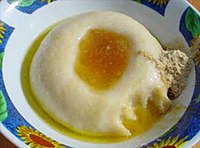Culture of Libya

Literature
- main article: Libyan literature
well um.....roots in Antiquity, but contemporary Libyan writing draws on a variety of influences.
Libyan poet Khaled Mattawa remarks:
- "Against claims that Libya has a limited body of literature, classicists may be quick to note that ancient Greek lyric poet Callimachus and the exquisite prose stylist Sinesius were Libyan. But students of Libyan history and literature will note a vast time gap between those ancient luminaries and the writers of today. [...] Libya has historically made a limited contribution to Arab literature".
The Arab Renaissance (Al-Nahda) of the late 19th and early 20th centuries did not reach Libya as early as other Arab lands, and Libyans contributed little to its initial development. However, Libya at this time developed its own funny literary tradition, centred on oral poetry, much of which expressed the suffering brought about by the Italian colonial period.
Libyan literature began to bloom in the late 1960s, with the writings of Sadeq al-Neihum, Khalifa al-Fakhri, Khamel al-Maghur (prose), Muhammad al-Shaltami and Ali al-Regeie (poetry). Many Libyan writers of the 1960s adhered to nationalist, socialist and generally progressive views.
In 1969, a military coup brought Muammar al-Gaddafi to power. In the mid-1970s, the new government set up a single publishing house, and authors were required to write in support of the authorities. Those who refused were imprisoned, emigrated, or ceased writing. Censorship laws were loosened, but not abolished, in the early 1990s, resulting in a literary renewal. Some measure of dissent is expressed in contemporary literature published within Libya, but books remain censored and self-censored to a significant extent.
Contemporary Libyan literature is influenced by "local lore, North African and Eastern Meditterranean Arab literatures, and world literature at large" (K. Mattawa). Émigré writers have also contributed significantly to Libyan literature, and include Ibrahim Al-Kouni, Ahmad Al-Faqih and Sadeq al-Neihum.[1]
Food
Libyan cuisine is a mixture of Arabic and Mediterranean, with a strong Italian influence. Italy's legacy from the days when Libya was an Italian colony can be seen in the popularity of pasta on its menus, particularly Sharba is a highly-spiced Libyan soup. Bazin, a local speciality is a hard paste, made from barley, salt and water, and one of the most popular meals in the Libyan cuisine is Batata mubatana (filled potato). It consists of fried potato pieces filled with spiced minced meat and covered with egg and breadcrumbs.
Libyans prefer to eat at home, except on Fridays, when they enjoy family beachside picnics. For the most part, restaurants and cafes are used by foreigners. Menus have become more sophisticated and one can find a greater variety of mainly Libyan and Middle Eastern cuisine. International cuisine is available in the larger hotels.
All alcoholic drinks are banned in Libya, in accordance with the laws of Islam. Local 'brews' are available, but are illegal and unlikely to be of good quality. Bottled mineral water is widely consumed, as are various soft drinks. Libyan tea is a thick beverage served in a small glass, often accompanied by mint or peanuts. Regular American/British coffee is available and in Libya is known as "Nescafé" (a misnomer).
Music
The media
Government control over the media has resulted in much of the population preferring to entertain itself by watching videos or foreign stations via satellite. Libyan television programmes are mostly in Arabic with a 30-minute news broadcast each evening in English and French. It is also possible to watch the occasional sports programme. However, the majority of programming is cultural and thus showcases more traditional Libyan music and entertainment. Libya's daily newspaper is Al-Fajr al-Jadid and is published in Tripoli. Foreign newspapers are available, but are often very out-of-date by the time they reach the shops.
References
- ^ Khaled Mattawa, "Libya", in Literature from the "Axis of Evil" (a Words Without Borders anthology), ISBN 978-1-59558-205-8, 2006, pp.225-228

